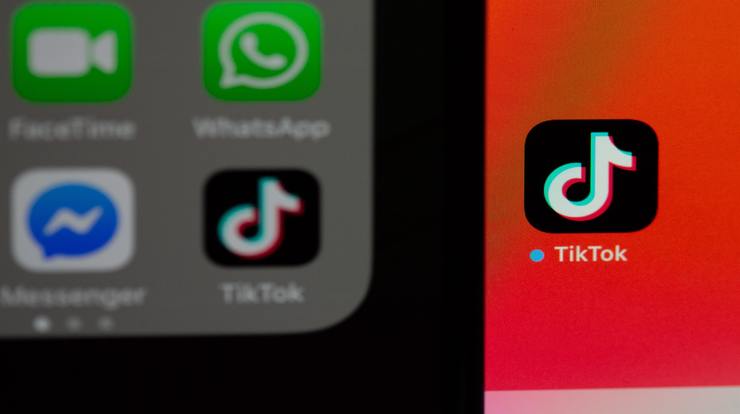Photo by Solen Feyissa on Unsplash
Social Media and American Security
TikTok, the popular social media/video sharing app where users can showcase themselves and gain a mass following, has come under fire recently from the current administration for it’s Chinese roots. President Trump has indicated the problem with the app is it’s mass collection and distribution of data, as the app’s main attraction is the ability to search content from personal interests.
It’s no secret that President Donald Trump is both a fan and critic of social media. His latest endeavor against social video platform, TikTok, has been called “a retaliation”. A movement on TikTok to reserve tickets for Trump’s Tulsa rally left hundreds of empty seats. While President Trump is no stranger to retaliatory actions, there may be some validity to the claims against Chinese owned TikTok.
Yesterday, we published a blurb about a warning issued by the Department of Homeland Security’s Cybersecurity and Infrastructure Security Agency (DHS CISA), the Department of Defense’s Cyber Command (CyberCom), and the Federal Bureau of Investigations (FBI). A resurgence of a recognized form of malware, Taidoor, has connections to Chinese state-sponsored hackers. Because of Taidoor and other similar incidents, it would be wise to call into question mass amounts of data being passed through Chinese servers.
Data Security Law of China
The Data Security Law of China (DSL) was passed on July 3rd, 2020 and will go into effect in 2021. While changes are expected, China is considering allowing the law to have an extra-territorial effect. This means that companies operating within China would be required to disclose the data information for operations outside of the country.
Currently, the draft contains 7 chapters and 51 articles. The article defining “data” notes data “as any record of information in electronic or non-electronic form; and the definition of “data activity” as activities such as collection, storage, processing, use, provision, trading, and disclosure of data.”
In layman’s terms, any data shared, collected, stored, or otherwise transmitted through a Chinese based business is fair game. Additionally, article 2 sets out rules for extraterritorial jurisdiction. Therein lies the problem. Extraterritorial jurisdiction means that the Chinese government could require companies operating within the country to disclose the information of users outside of China.
Data Protection
Let’s be clear, this is not a concept exclusive to China. The US has it’s own extraterritorial jurisdiction laws. On a federal level, the FTC is in charge. Since implementation and even interpretation is left to the individual states, however, there doesn’t seem to be clear definition of who should enforce said laws.
The problem comes with the fact that tensions with China are already high. Between the “trade war” and US policing of Chinese state-sponsored hacking groups, there is a relative amount of concern involved with the free distribution of American data. While the DSL isn’t set up specifically to target US users, the impact to us is greater because of strained relations.
A US Solution
President Trump is still toying with the idea of an all out ban on TikTok. It hasn’t come due in part to Microsoft’s interest in acquiring the US operations of the app. That acquisition would effectively remove the reach of the newly passed DSL and Chinese government from the collection of American data. Spokespersons for both Microsoft and TikTok have declined commenting on the acquisition as of now.
This would be a huge leap forward for Microsoft, who has yet to invest in a lucrative social platform. Unfortunately for TikTok and its users, there has been no official announcement. On the other hand, there has also been no formal ban on the app either.
Why The Pushback
So the question remains, if there’s sufficient evidence that apps created and maintained outside of the United States can impact US security, why is there push back from the public?
The monetization of TikTok is one of its appeals to users. Much like YouTube when it first began, TikTok’s platform is not yet overrun with the hoards of self-proclaimed influencers. This allows users more chances at becoming viral and therefore monetizing the ad revenues offered by the app.
Additionally, most young users find it a great way to connect, especially now as they’re finding their abilities to engage with the outside world limited due to COVID-19 changes. The app not only presents viral dance moves, but also cool DIYs, cooking lessons, and the ability to follow interesting pets (there’s a lady with a squirrel for a pet, and I’m obsessed.)
While some say this isn’t enough of a reason to compromise security, another prevalent theory is that highlighting the country of origin can lead to increased violence against Americans of Asian descent. It’s not so far fetched an idea. In the wake of the current pandemic, violence against Asian-Americans is increasing.
While we seem hyper focused on the Chinese right now, other countries are considering similar jurisdiction. Just last month, Germany proposed its own ideas for the monitoring of data. There has been little to no news, however, on that proposition gracing the consciousness of the American people.
The Perfect Solution
I’m not sure there is a perfect solution. The acquisition of TikTok by an American company will go a long way toward providing better security for the US. It will also allow users monetizing and enjoying the app to continue to do so unrestricted. Separating the US portion of the app, however, could lead to complications as previously seen in other acquisitions.
It might be tempting to push for a ban of the app, or all foreign apps, altogether. But isolation of that kind hovers dangerously close to the idea that all media should be controlled by the government. Finding a secure solution without becoming too inclusive is the best way to go.
Since no solution has yet to be announced, we’ll have to wait and see the fate of TikTok. I’m sure that with this decision will come precedents for how to handle foreign run apps in the future.
In the meantime, maybe look up your next favorite dance or appetizing recipe on YouTube.
As always, stay safe out there.




